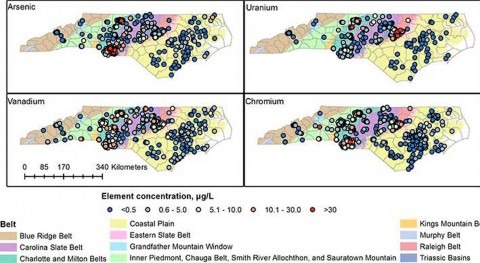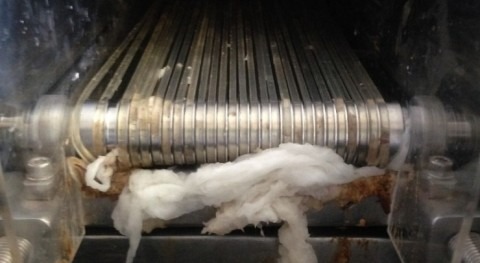A new study which combines measurements from nearly 1,400 drinking water wells across North Carolina estimates that more than half of the wells in the state’s central region contain levels of cancer-causing hexavalent chromium in excess of state safety standards.
“Though often thought of as a byproduct of industrial contamination, hexavalent chromium can form naturally in groundwaters, depending on the local aquifer geology and water chemistry,” said Avner Vengosh, professor of Earth and Ocean Sciences in the Nicholas School of the Environment at Duke.
Other studies have identified naturally occurring hexavalent chromium in groundwater in Arizona, California, Argentina, Brazil, Greece, Italy, and Mexico.
Only a single North Carolina well in the study violated the maximum contaminant level for total chromium set by the U.S. Environmental Protection Agency of 100 micrograms per liter. But the NC Department of Health and Human Service’s much lower health advisory level – 0.07 micrograms per liter – is set to protect against a one-in-one-million risk of cancer over a 70-year life span. That level of hexavalent chromium was exceeded by 470 of the 865 wells for which the contaminant was measured.
“There is a huge gap between 100 and 0.07 micrograms per liter,” said Rachel Coyte, a doctoral student in Vengosh’s lab who was lead author on the study. “If you follow the EPA guidance, we have no problem. But if you look at the NC health recommendations, there is a significant population exposed to hexavalent chromium concentrations at or exceeding a one-in-one-million lifetime risk of cancer. Why is this gap not being addressed?”
The researchers used the large dataset to develop a model that predicts the occurrence of hexavalent chromium above the health standard in drinking water wells based on the well location’s geology, and on easily measured groundwater chemistry parameters such as water pH, oxygen content, and salinity. They also calculated the probabilities that a given well would exceed the 0.07 microgram per liter health advisory level for specific geologic belts in the state.
.jpg)
Photo: Areas of the state with the largest number of groundwater users, such as Wake and Mecklenburg Counties, coincide with some of the highest probabilities for finding hexavalent chromium above state health advisory levels (shown in red). Credit: Rachel Coyte, Duke Univ.
The occurrence of hexavalent chromium is predicted to be particularly high in wells located in the Piedmont region, where over 50% of the wells are expected to have concentrations of hexavalent chromium above the health advisory level, Vengosh said.
Statewide, nearly 4 million people rely on groundwater as their primary source of drinking water. “The areas where we see the largest number of groundwater users, like Wake and Mecklenburg Counties, coincide with some of the highest probabilities for the occurrence of hexavalent chromium above the health advisory level,” Coyte said.
“Unlike public groundwater systems, private wells have no testing requirements and therefore many private well owners do not know the concentration of hexavalent chromium in their well water,” Vengosh said. “Since we show that total chromium can be a good proxy for the presence of hexavalent chromium, homeowners can test total chromium, which is more common and cheaper.”
While home water filtration for hexavalent chromium was not tested in this study, several technologies do exist to remove hexavalent chromium from drinking water, including reverse osmosis desalination.


















